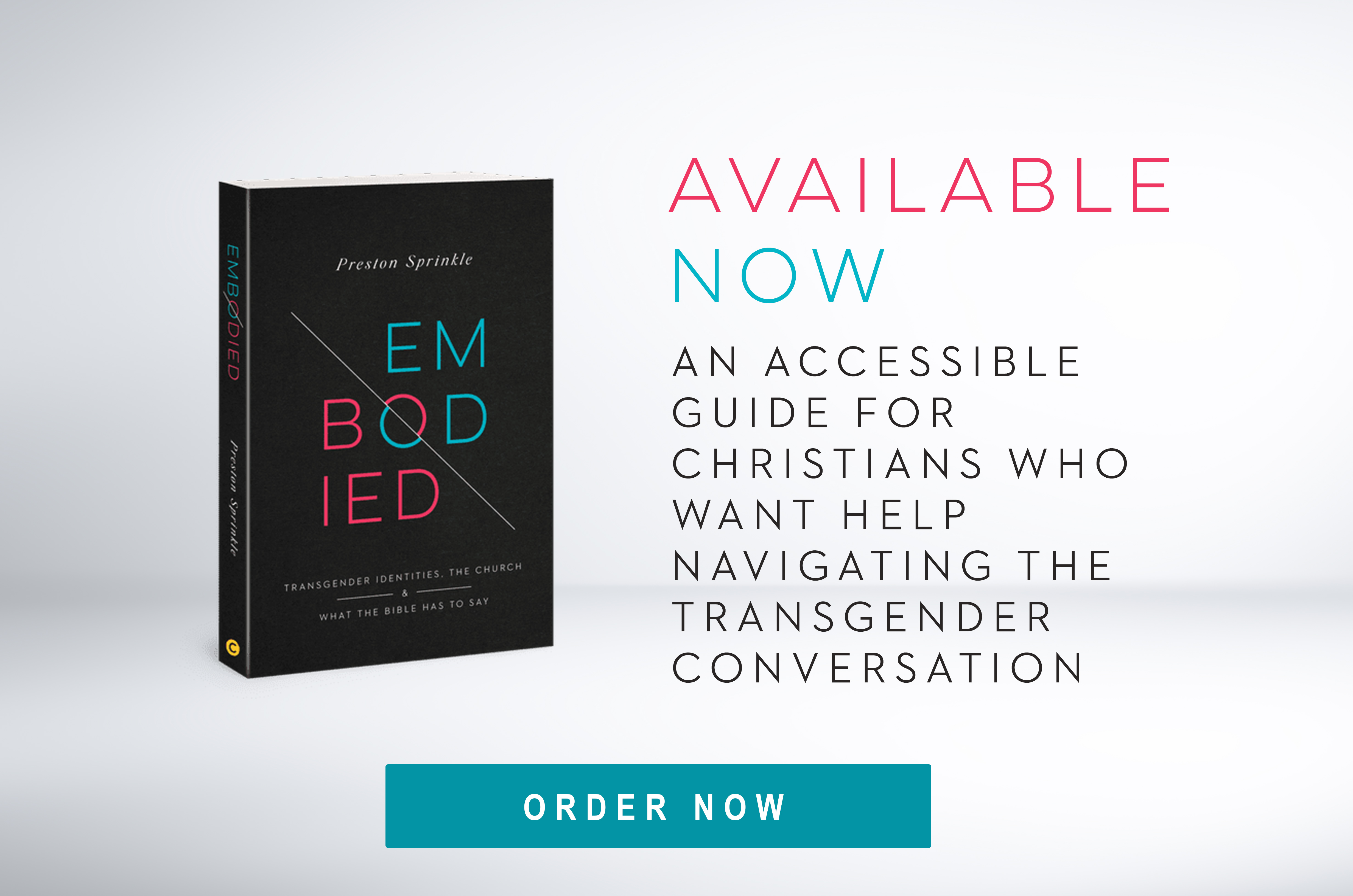
By Gregory Coles. Greg is a Senior Research Fellow at The Center and is the author of Single, Gay, Christian and No Longer Strangers.
In a blog post I wrote for The Center almost three years ago, I made a passing reference to Colton Underwood, who at the time was making headlines as the first virgin bachelor on reality TV’s The Bachelor. “Failure to pursue and fulfill one’s sexual attraction is understood as almost freakishly nonnormative in 2019,” I wrote, “even if you’re as heterosexual as a man simultaneously dating 30 women on TV.”
As it turns out, I was rather too quick in assuming Colton’s heterosexuality. In an interview with Good Morning America this April, Colton announced that he is gay and that his time on The Bachelor was a last-ditch effort to become straight. This revelation, and the drama surrounding it, are now the subject of a new Netflix series entitled Coming Out Colton, released earlier this month.
Buy Now!
Embodied: The Latest from Preston Sprinkle
For our present purposes, I have no interest in delving into the vicissitudes of the series or the controversies surrounding Colton’s previous relationships. Instead, I want to focus on what we might learn from the series’ treatment of Colton’s Christian faith.
Episode 4 of the series, entitled “Church,” begins with Colton meeting a country singer named Cody Belew at a party. Cody, who is also gay and grew up in a Southern Baptist church, plays a song that narrates his own childhood wrestling with his sexuality:
I prayed like a madman in my room,
“Lord, save me from myself
I’ll do whatever I need to do
Just make me someone else”
While there’s no clear distinction in these lyrics between sexual identity and sexual activity, the primary angst of the song has to do not with behaviors but with an unchosen state of being. Young Cody is praying (unsuccessfully) to become straight. And his unanswered prayers, like Colton’s own unanswered prayers, have significant implications for his subsequent journey of faith.
As Colton continues to explore what his coming out as gay means for his Christian faith, the failure of his traditional Christian community to distinguish same-sex orientation from same-sex sexual acts continues to plague his conversations. We see this failure most plainly in his coming out conversation with the pastor of his current church.
He makes the phone call from the comfort of his bed, his hands and voice trembling slightly. Immediately we hear his pastor over the speakerphone ask a clarifying question: “You say you came out gay, what does that mean for you?”
Colton’s reply is, in many ways, exemplary of what so many LGBTQ and same-sex attracted people are asking of their faith communities when they first come out. Here’s what he says:
“Coming out for me has meant I don’t hate myself anymore. I’m not praying the gay away like I did for so many years. I distinctly remember thanking God for making me The Bachelor. I distinctly remember thanking him for getting me out of being gay. I thought that was my way out. And I think that was me forcing myself to be straight. And I’m exploring what that means with my faith and what that means [for] me as a human being. But I don’t know how to navigate it. I don’t know what to do.”
Notice that these words don’t assume any particular posture with respect to sexual ethics. As with Cody’s song earlier in the episode, Colton isn’t talking about sexual behavior at all in this moment. He’s simply naming his experience of orientation, asking what it means to be honest about that experience and continue to follow Jesus. He wants to know whether he can continue to authentically participate in his Christian community as someone no longer trying to be straight.
How the pastor responds to Colton is, unfortunately, paradigmatic of how many Christian leaders have responded in similar coming out conversations. Rather than affirming that same-sex oriented people are every bit as welcome in the kingdom of heaven as opposite-sex oriented people, the pastor plays into Colton’s worst fears by telling him, “I would say homosexuality is a sin because the Bible makes it pretty clear that it is.” Conflating sexual orientation together with sexual behavior using the ambiguous word homosexuality, the pastor gives the impression that Colton’s mere existence as a same-sex oriented person is itself already sinful.
This isn’t to say that the pastor’s response to Colton is altogether bad. In fact, his very first statement of biblical fact seems like a promising beginning: “I believe that the Bible makes it very clear that Jesus was willing to lay down his life on the cross for any one of us.”
But instead of applying that truth to Colton’s experience as a gay person, by driving home the point that no experience of sexuality or sexual attraction disqualifies us from following Jesus, the pastor goes on to take umbrage at Colton’s self-identification as gay. He tells Colton that he disagrees with “what you’re saying about who you truly are” and that Jesus “just wants to change everything inside of you.” In other words, Colton is not really gay; and if he truly accepted Jesus, his sexual orientation would change.
As the pastor says these things, the shake in Colton’s hands becomes more pronounced. By the time they conclude their conversation in prayer, we the viewers feel the weight of Colton’s dilemma. If he’s no longer willing to closet himself and aspire to heterosexuality, he is (in this pastor’s view) no longer authentically pursuing Jesus.
It’s no wonder, then, that the episode concludes with Colton visiting a Metropolitan Community Church that affirms same-sex marriage for followers of Jesus. The pastor of this church tells Colton, “I just want you to hear that you are loved and you are accepted fully, regardless of who you are, how you are, and what you want.” Yet again, there is no distinction made between sexual orientation and sexual behavior; the two are presumed to be inextricably linked. But this time, Colton hears the message he has waiting for:
You don’t need to become straight to be a disciple of Jesus. You don’t need another decade in the closet, another failed attempt at a straight relationship, another bout on The Bachelor. You can follow Jesus exactly as you are.
I can’t help but wonder what would have happened if the first pastor Colton spoke to had said something like this. What if Colton had been invited, from the very beginning of his spiritual journey, to quit trying to become straight? What if his pastor’s response to his coming out had been, “I know so many gay people who love Jesus and live in obedience to him! Let’s talk about what it might look like for you to be one of them!”
Of course, Coming Out Colton is (like all reality TV) a partial and performative and highly edited version of reality. There’s no way of knowing exactly how Colton’s conversation with his pastor transpired, which parts were cut out for time or to emphasize a particular ideological perspective. But Colton’s reflection at the end of the episode is reminiscent of the words of so many other flesh-and-blood LGBTQ people in the 21st century:
“I feel like… I was asked to leave part of myself behind to stay close to God.”
I long for a world where all of us can instead boldly say, “I’ve been invited to bring my whole self to God, and to place every bit of my sexuality and gender identity under Christ’s lordship, and to know that I am more deeply loved than I ever dared to imagine.”
Or, as Cody Belew sings at the end of his country song, in a moment that is both theologically fraught and deeply insightful:
God’s had a hold of me all of my life
And Lord, I’m hanging on tight

